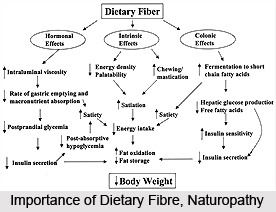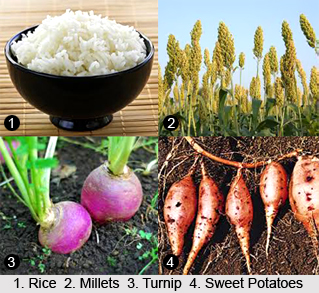 Importance of Dietary fibres lies in the maintenance of health and prevention of diseases. Recent studies has shown the importance of dietary fibre and indicated that sufficient intake of fibre-rich diet may help avert obesity, colon cancer, heart disease, gallstones, irritable bowel syndrome, and diabetic conditions. Studies have also established that dietary fibre is a collection of elements with a variety of functions rather than a single substance with single function as was assumed earlier.
Importance of Dietary fibres lies in the maintenance of health and prevention of diseases. Recent studies has shown the importance of dietary fibre and indicated that sufficient intake of fibre-rich diet may help avert obesity, colon cancer, heart disease, gallstones, irritable bowel syndrome, and diabetic conditions. Studies have also established that dietary fibre is a collection of elements with a variety of functions rather than a single substance with single function as was assumed earlier.
Fibre in the diet promotes more regular bowel movements and softer stools having increased weight. The softness of stools is basically due to the presence of emulsified gas which is produced by the bacterial action on the fibre. A high fibre intake results in better efficiency in the peristaltic movement of the colon. This helps in relieving the constipation which is the main cause of a number of acute and chronic diseases. Recent studies advocate that increasing the dietary fibre intake may be advantageous for patients with irritated bowel syndrome who have diarrhoea and rapid colonic transit, as well as to those who have constipation and slow transit. The high fibre diet, like bran, thus regulates the condition inside the colon so as to keep away from both extremes - constipation and Diarrhoea. Investigations have shown that several potential carcinogens are produced in the faeces.
Dietary fibre increases the bacteria in the large intestines which require nitrogen for their growth. This in turn diminishes the chances of cancerous changes in cells by reducing the amount of ammonia in the large bowel.  Fibre reduces the absorption of cholesterol in the diet. It also slows down the rate of absorption of sugars from the food in the digestive system. Certain types of fibre boost the viscosity of the food content. This increased thickness indirectly reduces the need for insulin secreted by the pancreas. Thus a fibre-rich diet can help in diabetes mellitus. The most important food sources of fibre are unprocessed wheat bran, whole cereals, such as, rice, barley, Wheat, rye, millets; legumes such as beet, turnip, potato, carrots, and sweet potato; fruits like mango and guava and leafy vegetables such as cabbage, lettuce and celery.
Fibre reduces the absorption of cholesterol in the diet. It also slows down the rate of absorption of sugars from the food in the digestive system. Certain types of fibre boost the viscosity of the food content. This increased thickness indirectly reduces the need for insulin secreted by the pancreas. Thus a fibre-rich diet can help in diabetes mellitus. The most important food sources of fibre are unprocessed wheat bran, whole cereals, such as, rice, barley, Wheat, rye, millets; legumes such as beet, turnip, potato, carrots, and sweet potato; fruits like mango and guava and leafy vegetables such as cabbage, lettuce and celery.
The foods which are entirely devoid of fibre are fish, eggs, meat, milk, cheese, fats and sugars. Bran, the outer coverings of grains, is one of the richest sources of dietary fibre. Wheat and corn bran are extremely beneficial in relieving constipation. Experiments show that oat bran can reduce cholesterol levels to a great extent. Corn bran is considered more versatile. It relieves constipation and also lowers LDL cholesterol, which is one of the more harmful kinds. Besides being rich in fibre, bran has a real food value being rich in time, iron and vitamins and containing a considerable amount of protein. Legumes have high fibre content. Much of this fibre is water- soluble, which makes legumes likely agents for lowering cholesterol. Soyabeans, besides this, can also help control glucose levels. The types of fibre contained in vegetables and fruits contribute significantly towards good health. The vegetables with the biggest fibre ratings include potatoes, parsnips, sweet corn, carrots, and peas. Among the high ranking fruits are pears, raspberries, strawberries and guavas.
There are conflicting views as to the requirement of dietary fibre for good health. There is no recommended daily dietary allowance for it and hardly any data about optimum amounts. Excessive consumption of fibre, in particular bran, should however, be avoided. Due to its content of crude fibre, bran is comparatively harsh and it may irritate the delicate functioning of the digestive system, especially in the sick and the weak. Too much use of fibre may also result in loss of valuable minerals like calcium, phosphorus, magnesium and potassium from the body through excretion due to quick passage of food from the intestine.




